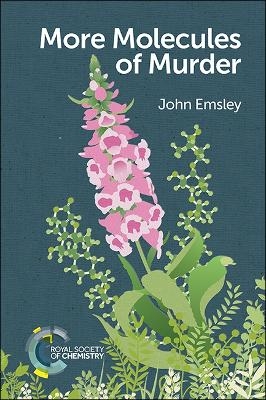
More Molecules of Murder
Seiten
2017
Royal Society of Chemistry (Verlag)
978-1-78801-103-7 (ISBN)
Royal Society of Chemistry (Verlag)
978-1-78801-103-7 (ISBN)
Eight years after the highly acclaimed Molecules of Murder, John Emsley is again applying his winning formula to writing a book about crimes of murder and attempted murder carried out with natural and man-made poisons.
How can a plant as beautiful as the foxglove be so deadly and yet for more than a century be used to treat heart disease? The same is true of other naturally occurring molecules as will be revealed in this current book by award-winning author and chemist, John Emsley.
More Molecules of Murder follows on from his highly-acclaimed earlier book Molecules of Murder, and again it deals with 14 potential poisons; seven of which are man-made and seven of which are natural. It investigates the crimes committed with them, not from the point of view of the murderers, their victims, or the detectives, but from the poison used. In so doing it throws new light on how these crimes were carried out and ultimately how the perpetrators were uncovered and brought to justice.
Each chapter starts by looking at the target molecule itself, its discovery, its chemistry, its often-surprising use in medicine, its effects on the human body, and its toxicology. The rest of the chapter is devoted to murders and attempted murders in which it has been used. But, be reassured that murder by poison is not the threat it once was, thanks to laws which restrict access to such materials and to the skills of analytical chemists in detecting their presence in incredibly tiny amounts.
How can a plant as beautiful as the foxglove be so deadly and yet for more than a century be used to treat heart disease? The same is true of other naturally occurring molecules as will be revealed in this current book by award-winning author and chemist, John Emsley.
More Molecules of Murder follows on from his highly-acclaimed earlier book Molecules of Murder, and again it deals with 14 potential poisons; seven of which are man-made and seven of which are natural. It investigates the crimes committed with them, not from the point of view of the murderers, their victims, or the detectives, but from the poison used. In so doing it throws new light on how these crimes were carried out and ultimately how the perpetrators were uncovered and brought to justice.
Each chapter starts by looking at the target molecule itself, its discovery, its chemistry, its often-surprising use in medicine, its effects on the human body, and its toxicology. The rest of the chapter is devoted to murders and attempted murders in which it has been used. But, be reassured that murder by poison is not the threat it once was, thanks to laws which restrict access to such materials and to the skills of analytical chemists in detecting their presence in incredibly tiny amounts.
Ethylene Glycol for Antifreeze and Loved Ones;
Oxalic Acid and Murders in Manila and Liverpool;
Acrylamide in Fried Foods and in Auckland;
Difenacoum, Amitriptyline and York;
Temazepam and the Man with a Murderous Plan;
Potassium Chloride: Essential to Life Yet Deadly;
Tetramethylenedisulfotetramine, a Mouthful Best Avoided;
Gelsemine and Cat Meat Stew;
Strychnine and Cream;
Digitalis and a Mysterious Death in Verona in 1329;
Curare and the Psychopathic Surgeon from Argentina;
Aconitine and Wimbledon;
Cantharidin and Spanish Fly;
Hemlock at the End of it All
| Erscheinungsdatum | 13.07.2017 |
|---|---|
| Verlagsort | Cambridge |
| Sprache | englisch |
| Maße | 152 x 228 mm |
| Gewicht | 380 g |
| Themenwelt | Sachbuch/Ratgeber ► Natur / Technik |
| Naturwissenschaften ► Chemie ► Analytische Chemie | |
| Recht / Steuern ► Strafrecht ► Kriminologie | |
| ISBN-10 | 1-78801-103-1 / 1788011031 |
| ISBN-13 | 978-1-78801-103-7 / 9781788011037 |
| Zustand | Neuware |
| Haben Sie eine Frage zum Produkt? |
Mehr entdecken
aus dem Bereich
aus dem Bereich


